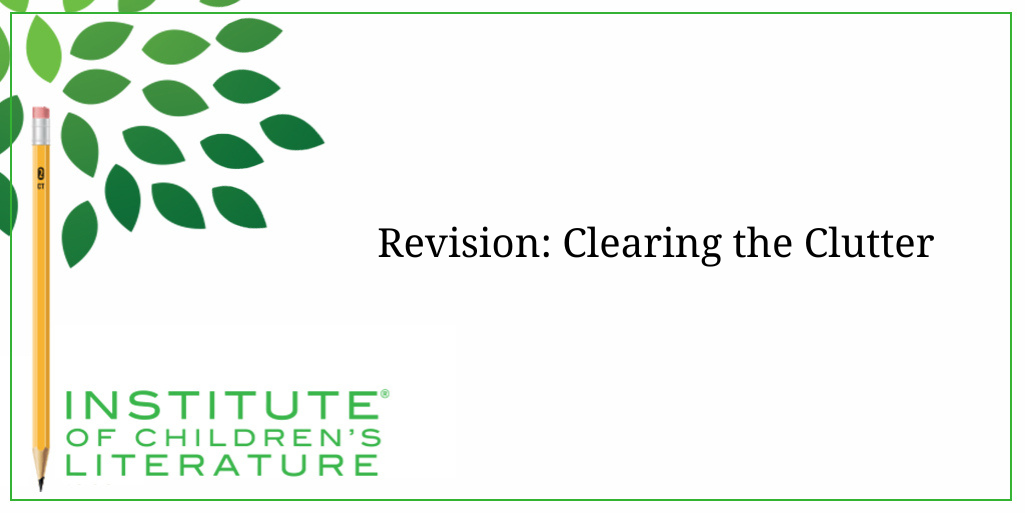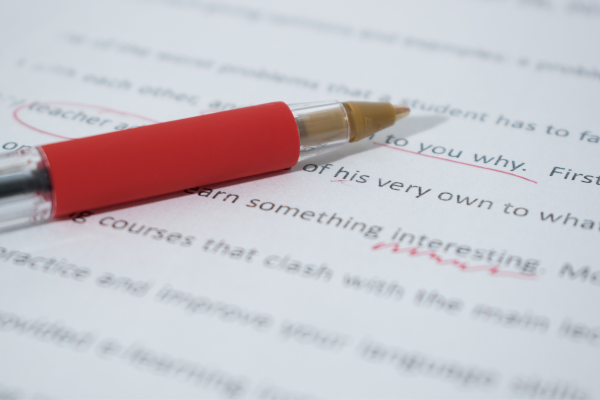
5 Ways Writers Can Prep for 2025 Goal Setting
Before we roll on to the new writing year, let’s harness our optimism for the blank slate before us and prepare for our 2025 Goal Setting just for writers.

Virtually all rough drafts are full of clutter. Stories have scenes they don’t need. Scenes have dialogue that rambles or action that is unclear and verbose. Sentences bloat. Good writing becomes hidden in the clutter and the only way to really showcase what works is to rid your story of what doesn’t.
Most of us aren’t quite so gleeful about cutting out the words that don’t add life and energy to our work, but cutting is a valuable part of revision. It isn’t the only part. It isn’t even one of the most important parts, but with the tight word counts of most children’s writing, it is a thing we must learn to do well.
Do your characters bob their heads too much? Does every teen roll their eyes constantly? Do you parse every scene through a “look” action? Are you falling back too often on simple emotional marker actions like “smile,” or “laugh,” or “shrug?”
Searching for overused patterns of action can help you cut words, because it will lead to paying attention to the action and judging if it adds anything to the scene. Unfortunately, one of the side effects of looking at these easily overused choices is that sometimes the replacement action has more words than the original. Yes, if you were already over your allotted word count, this can be a problem.
That doesn’t mean you shouldn’t consider the new action if it adds something important to your characterization or plot progression. Sometimes it’s worth the effort it will cost to cut somewhere else. Never reject the perfect words to use the shorter words. Instead, find the places where perfect and short coincide. They’re in there.
Newer writers will often make choices because they believe it sounds more “writerly.” The result of trying to be writerly is overwritten prose that also tends to be wordy. When prose is overwritten, it is too ornate and may dip toward cliché. Writerly writing never sounds casual or natural. Let’s look at a bit of wordy writing that might have been composed to sound writerly, and how it could be trimmed to make it cleaner, more direct, and less wordy.
Mistakes are being made by writers all along the way as they are composing and creating the stories that will be carrying all their hopes to the readers eagerly awaiting these words.
Wow, thirty two words right there. Let’s look at some of the wordiest problems.

Mistakes are being made by writers…
Active voice:
Writers make mistakes…
Simply switching from passive voice to active voice cut fifty perfect of the words in that snippet. Passive voice is not universally awful. Sometimes it can be exactly what you need.
For example, if you want to tell me about damage to your car, you might say: “Last week, some guy totaled my car in an accident.” That’s active voice. But the subject, “some guy” is vague. If you’re not going to tell us who, or if the subject really doesn’t matter, passive voice can be the stronger choice.
Consider this passive voice construction: “My car was totaled last week.” This is actually one word shorter because the person doing the hitting is completely removed. The verb construction “was totaled” is actually more wordy, but the sentence ends up being stronger because the vague part is cut out.
Now back to our badly overwritten example. How else could this wordy mess be cut shorter?
Writers make mistakes all along the way as they are composing and creating the stories that will be carrying all their hopes to the readers eagerly awaiting these words.
First, what are we trying to say here? What are the core points?
1. Writers make mistakes
2. They do it while composing and creating, so we’re probably talking about rough drafts
3. The stuff they write carries their hopes to the reader? Huh? Does that actually mean anything? Think about it. Does your writing carry your hopes? Really?
4. Readers are eagerly awaiting these words. Unless we’re talking about a well-known author, this is probably not really happening. And if we are talking about well-known authors, maybe say that plainly.
So let’s try to say more with less:
Even well-loved writers make mistakes in their rough drafts.
How about that? It’s direct. It presents the most important part of the sentence, that our rough drafts are full of mistakes, no matter how famous we may be, and it says what we mean in fewer, clearer words.
I’m not going to launch into an anti-adverb or adjective diatribe. I don’t hate adverbs. I don’t hate adjectives. Sometimes they bring info that you can’t get any other way, and sometimes they affect the rhythm of the writing in a positive way. But all too often, adjectives and adverbs slip in simply because it’s the first thing we thought of. The same is true if we use several words to say what one can convey. Consider the following:

She spoke too softly to be heard.
The path curved and twisted through the woods.
These can become:
He strode into the room.
She murmured inaudibly.
The path meandered through the woods.
In fact, sometimes choosing a single word offers us all kinds of different options.
“He strode into the room” is different than “He rushed into the room.” It has a different energy even though both verbs are reasonable substitutes for “He walked quickly,” and we get a different feeling for his emotions simply by changing one word. This is why we closely examine adjectives, adverbs, and word choices, in general. We want to use the word that conveys exactly what we mean.
Now, go clear the cutter and get to the heart of your story.
With over 100 books in publication, Jan Fields writes both chapter books for children and mystery novels for adults. She’s also known for a variety of experiences teaching writing, from one session SCBWI events to lengthier Highlights Foundation workshops to these blog posts for the Institute of Children’s Literature. As a former ICL instructor, Jan enjoys equipping writers for success in whatever way she can.

Before we roll on to the new writing year, let’s harness our optimism for the blank slate before us and prepare for our 2025 Goal Setting just for writers.

Writers can be thin-skinned when it comes to getting feedback on their work. Let’s look at 4 ways to positively deal with constructive criticism!

Rejection is part of the territory when it comes to being a writer. Today we offer reflection for writers to help redirect your efforts after a rejection.
1000 N. West Street #1200, Wilmington, DE 19801
© 2024 Direct Learning Systems, Inc. All rights reserved.
1000 N. West Street #1200, Wilmington, DE 19801
© 2024 Direct Learning Systems, Inc. All rights reserved.
1000 N. West Street #1200, Wilmington, DE 19801
© 2024 Direct Learning Systems, Inc. All rights reserved.
1000 N. West Street #1200, Wilmington, DE 19801
© 2024 Direct Learning Systems, Inc. All rights reserved.

1000 N. West Street #1200, Wilmington, DE 19801
© 2025 Direct Learning Systems, Inc. All rights reserved.

1000 N. West Street #1200, Wilmington, DE 19801
©2025 Direct Learning Systems, Inc. All rights reserved. Privacy Policy.
2 Comments